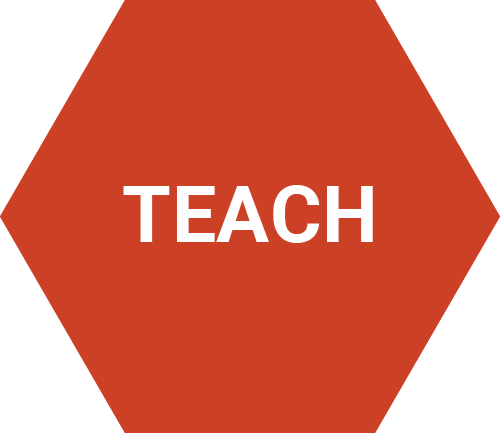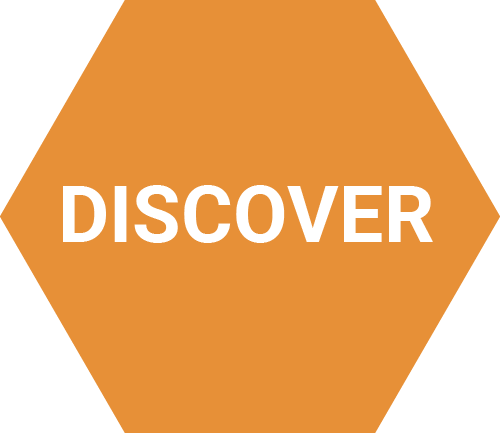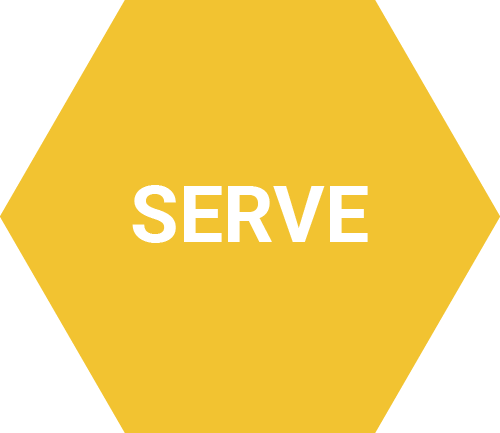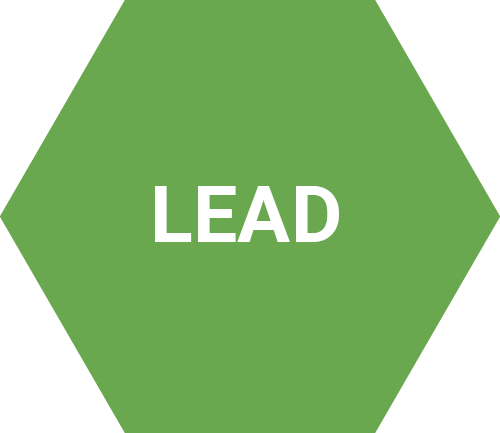School of Medicine faculty are already intelligent, ambitious and highly trained professionals with the necessary background for their specialty or field. Through our programming, we strive to develop them into a cadre of professional, competent and compassionate educators, researchers and leaders, with ongoing opportunities for growth and innovation.
Created by a dedicated team in the Office of Faculty Affairs and Faculty Development, this competency-based program focuses on five key areas that all types of faculty need for long-term success in their careers. This work has been presented at Drexel University’s 2018 Executive Leadership in Academic Medicine program and at the 2019 International Conference on Faculty Development in the Health Professions.
Teach
 Focus of work: Provide educational leadership and administration.
Focus of work: Provide educational leadership and administration.
Competency in teaching is dependent on a thorough understanding of content, demonstration of instructional skills and implementation of feedback-driven changes.
Early-career competencies
- Formulate learning objectives
- Present a lecture on a clinical or educational topic, including one-one-one teaching, small group, simulation, clinical rounds, and/or lab teaching;
- Demonstrate content knowledge
Universal career competencies
- Demonstrate curriculum design and instruction including the development of courses, presentations, and other course materials
- Utilize adult learning principles and teaching methods to enhance learning
- Identify learner needs and use learner strengths and deficiencies to establish future learning activities
Discover
 Focus of work: Design appropriate study including physiological, educational, social behavior and clinical trials.
Focus of work: Design appropriate study including physiological, educational, social behavior and clinical trials.
Discovery is a core tenant of the School of Medicine’s mission. Competency in this area is based on dedication to research and the ethics that guide it.
Early-career competencies
- Summarize trends in the field and formulate researchable questions
- Adhere to guidelines and regulations regarding the ethical conduct of research involving animal and human subjects
- Prepare abstract, presentation or poster with findings
Universal career competencies
- Use basic statistics and work with a statistician, as appropriate
- Prepare, submit, and revise manuscripts, guidelines and other grant applications
- Engage in the scholarship of teaching and learning
Serve
 Focus of work: Identify and participate in activities that serve the school, university and greater community.
Focus of work: Identify and participate in activities that serve the school, university and greater community.
Contributing time, expertise and energy that shapes the future of the university and community is essential to preserving institutional reputation.
Academic
- Participate in department, school, university, national and international committees, and organizations
- Recognize the various roles in committees and participate in increasing leadership positions
Clinical
- Identify and model the roles and responsibility of the attending physician
- Use and model use of evidence-based medicine and best practice guidelines
- Describe and work to limit barriers to health care access and utilization
Lead
 Focus of work: Recognize academic organizational structures and their relationships and develop an organizational chart and leadership team.
Focus of work: Recognize academic organizational structures and their relationships and develop an organizational chart and leadership team.
Leadership in the academic medical setting requires trust, empathy and organization, with an understanding of institutional priorities, strategic planning and advocating for individuals and resources.
Early-career competencies
- Establish trust and value diverse perspectives and talent
- Resolve and negotiate conflicts effectively
Universal career competencies
- Demonstrate ability to work on, establish and lead a team by fostering collaboration and cooperation
- Listen to individual perspectives and encourage individual initiative and growth
- Conduct effective meetings with a clear agenda and action plan
Advance
 Focus of work: Identify and manage the finances of projects, schools, medical centers and university, as appropriate.
Focus of work: Identify and manage the finances of projects, schools, medical centers and university, as appropriate.
Advancement in a career as a faculty member requires an understanding of the qualifications, processes and responsibilities that coincide with promotion. It requires familiarity with school and university policies and a robust network of professional colleagues.
Early-career competencies
- Communicate clearly, openly, honestly and concisely, using appropriate venue for oral, written and electronic formats
- Describe the requirements and process for promotion and tenure, develop and manage goals for career advancement
- Interpret and model values, ethics, behavioral codes and professional norms, including promoting individual self-awareness of multicultural and/or generational differences and practicing nonjudgmental interactions
Universal career competencies
- Develop emotional intelligence through training and development opportunities
- Establish and maintain network of professional colleagues